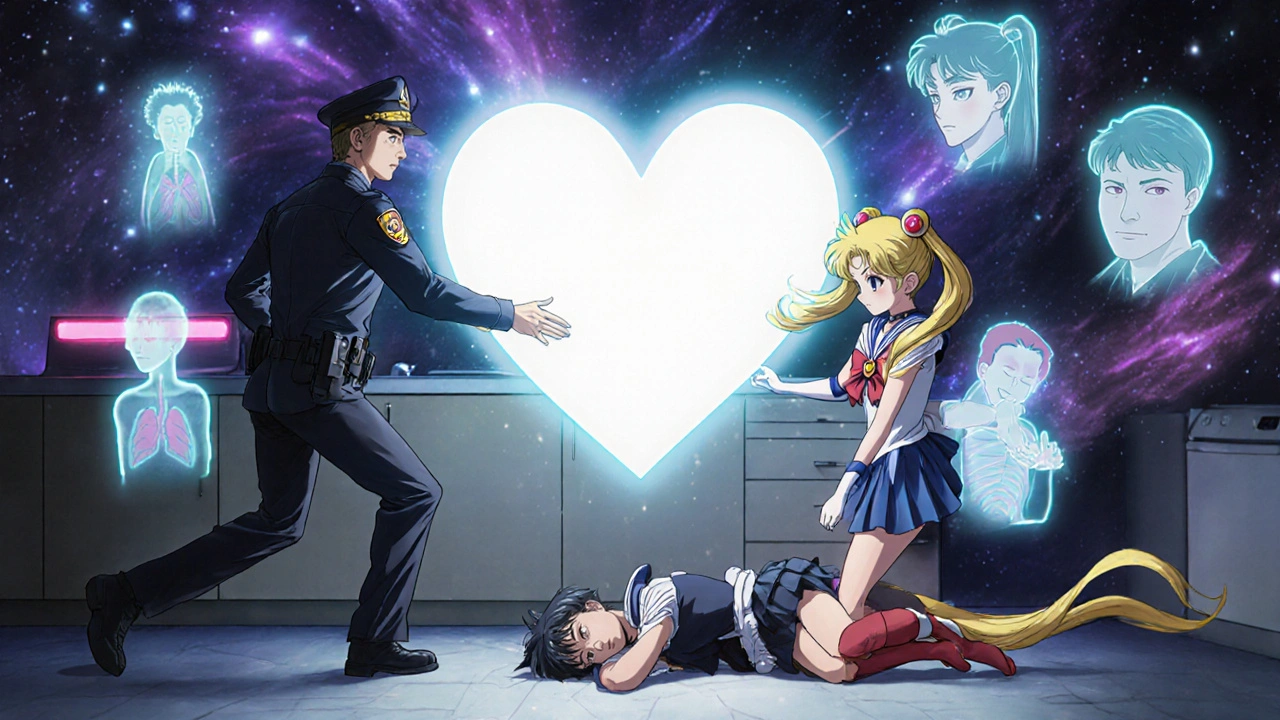Every year, over 697,000 people in the U.S. die from a heart attack. Many of these deaths could have been prevented-not by new drugs or fancy surgery-but by recognizing the signs early and calling emergency services immediately. The truth is, heart attacks don’t always look like what you see in the movies. There’s no dramatic clutching of the chest, no collapsing onto the floor. Sometimes, it’s just a strange pressure in your chest, or a jaw that aches for no reason, or sudden, unexplained fatigue that won’t go away.
What Does a Heart Attack Actually Feel Like?
A heart attack happens when blood flow to part of your heart gets blocked. That blockage starves the heart muscle of oxygen. The longer it goes without help, the more damage is done. Every minute counts. Research shows you lose about 1.5 million heart cells every minute after a heart attack starts.
The most common sign is discomfort in the center of your chest. It’s not always sharp pain. People describe it as:
- Pressure, like something heavy is sitting on your chest
- Squeezing or tightness
- A burning or full feeling
This discomfort lasts more than a few minutes-or it comes and goes. If you’ve ever had indigestion, this feels different. It doesn’t go away with antacids. It doesn’t improve when you sit down. It just stays there.
It’s Not Just the Chest
Almost two out of three people who have a heart attack feel pain or discomfort somewhere else in their upper body. This is where people get confused. They think, “My chest is fine, so it can’t be my heart.” But that’s exactly when things go wrong.
Look out for:
- Pain or numbness in one or both arms
- Discomfort radiating to your back, neck, or jaw
- Stomach pain that feels like indigestion or heartburn
One woman in Auckland described her heart attack as “a weird ache under my left shoulder blade.” She thought it was from sleeping funny. It wasn’t. Another man said his jaw hurt for three days before he collapsed. His dentist thought it was a tooth infection. It was his heart.
Other Symptoms You Can’t Ignore
These signs often show up alone-or with chest discomfort:
- Shortness of breath: You can’t catch your breath, even when you’re sitting still. This happens in 40% of cases, even without chest pain.
- Cold sweat: You break out in a sudden, clammy sweat-no fever, no exertion.
- Nausea or vomiting: Especially common in women. It feels like a bad stomach bug.
- Lightheadedness or dizziness: You feel like you might faint.
- Rapid or irregular heartbeat: Your heart races or skips beats for no reason.
- Extreme fatigue: Not just tired. You feel like you’ve run a marathon while lying in bed. Women report this more than men-nearly half of women feel this way before a heart attack.
These symptoms don’t always come together. Sometimes, it’s just one. And that’s why so many people delay calling for help.
Women Don’t Have the Same Symptoms as Men
Men are more likely to have classic chest pain. But women? Not so much. Only 64% of women feel chest pain during a heart attack, compared to 90% of men. That’s why women are more likely to be misdiagnosed.
Women are:
- 58% more likely to have shortness of breath as their main symptom
- 47% more likely to feel nauseous or throw up
- 37% more likely to have back or jaw pain without chest discomfort
And here’s something terrifying: women over 55 are twice as likely as men their age to feel overwhelming anxiety or stomach upset before a heart attack. One woman told her doctor she felt like “something awful was about to happen.” She was right. She had a heart attack the next day.

Older Adults Might Not Feel Pain at All
People over 75 often have what’s called a “silent heart attack.” No chest pain. No warning. Just fatigue, confusion, or sudden trouble breathing. Sometimes, they just feel “off.”
One in three heart attacks in people over 75 show no chest pain. That’s why it’s so dangerous. People think, “I’m just getting older.” But it could be their heart.
What About Younger People?
Heart attacks aren’t just for older adults. Cases in people aged 25 to 44 have been rising by 2% every year since 2000. Younger people often dismiss symptoms as stress, anxiety, or a bad diet. A 32-year-old woman in Wellington ignored jaw pain for three days. She thought it was TMJ. It was a blocked artery. She survived-but barely.
What Should You Do If You Suspect a Heart Attack?
Don’t wait. Don’t drive yourself. Don’t call a friend to come over. Call emergency services right now.
Here’s what to do:
- Call 911 (or your local emergency number). Ambulances can start treatment on the way. They get you to the hospital 25% faster than driving yourself.
- Chew one 300mg aspirin if you’re not allergic and your doctor hasn’t told you to avoid it. Aspirin helps thin the blood and can reduce damage.
- Stay calm and sit down. Don’t try to walk around or exert yourself.
- Don’t wait to see if it gets better. If symptoms last more than 5 minutes, call 911. Even if you’re not sure.
Most people wait over three hours before calling. That’s too long. The ideal window for treatment is 90 minutes from the first symptom. After that, the damage becomes permanent.

Why People Wait-And Why That’s Deadly
Why do so many delay help?
- Doubt: “Maybe it’s just gas.” “I’m probably just stressed.”
- Fear: “What if I’m wrong? Won’t I look foolish?”
- Denial: “I’m young. I’m healthy. This can’t be happening.”
One in three heart attack victims waits more than two hours because they’re afraid of being embarrassed. That fear kills. In fact, 31% of people who had heart attacks were sent home from the ER the first time they went in-with the wrong diagnosis.
And women? They’re 50% more likely to be misdiagnosed. Their symptoms don’t fit the “classic” mold. So they’re told it’s anxiety, indigestion, or menopause.
What Can You Do to Help Someone Else?
Heart attacks don’t always happen when you’re alone. Often, it’s a spouse, parent, or friend who notices first.
Here’s what to do if you think someone is having a heart attack:
- Don’t ask, “Are you okay?” Ask, “Are you having chest pain or trouble breathing?”
- If they say yes-or even hesitate-call 911 immediately.
- Don’t let them talk you out of it. “I’m fine” doesn’t mean they are.
- Chew aspirin if they can swallow it safely.
- Stay with them until help arrives.
Studies show that 44% of heart attack survivors say someone else insisted they get help. That person saved their life.
Technology Is Helping-But It’s Not a Replacement
Some smartwatches now detect irregular heart rhythms. AI tools can predict heart attacks 30 minutes before symptoms start. But these are tools, not safety nets.
You can’t rely on a device to tell you when something’s wrong. You need to know your body. If something feels off-trust it. Don’t wait for an app to beep.
Final Thought: It’s Not About Being Right. It’s About Being Safe.
You don’t need to be a doctor to recognize a heart attack. You just need to be brave enough to act.
If you’re unsure, call emergency services. It’s better to be wrong five times than to be right once and lose someone you love.
Heart attacks don’t care if you’re young, fit, or healthy. They don’t wait for convenient times. They strike when you’re driving, cooking, sleeping, or working. The only thing that matters is how fast you respond.
Know the signs. Trust your gut. Call 911. It could save a life-yours or someone else’s.

james lucas
November 24, 2025 AT 02:00man i never realized heart attacks could feel like just being super tired like you ran a marathon while lying down 😅 i thought it was always that movie stuff with the clutching chest and dramatic collapse. my grandma had one and she just kept saying she felt weird, like her body was shutting down. we thought it was just old age till she passed. i wish we knew then what i know now. also i think i spelled weird wrong but you get it
Jessica Correa
November 24, 2025 AT 19:12so true about women’s symptoms being ignored i had a friend who went to the er with jaw pain and nausea and they gave her antacids and sent her home she came back three days later in cardiac arrest and barely made it
why do doctors still think heart attacks only look like one thing
manish chaturvedi
November 25, 2025 AT 21:28as someone from india where heart disease is rising rapidly among younger populations due to diet and stress, i appreciate this article deeply. in our culture, many dismiss chest discomfort as indigestion or fatigue from work. we must change this mindset. my uncle, age 41, ignored arm pain for weeks thinking it was from lifting groceries. he had a major heart attack during a family dinner. now we educate everyone in our village. knowledge saves lives, not just medicine
Nikhil Chaurasia
November 27, 2025 AT 19:01my heart just dropped reading this. i remember my cousin-he was 38, fit, ran marathons. he thought his chest tightness was from yoga. three days later, he was gone. no warning. no drama. just… gone. how many more are out there thinking it’s just stress? how many more are being told they’re overreacting? this isn’t just medical info-it’s a cry for us to stop being polite about death
Holly Schumacher
November 29, 2025 AT 08:21Actually, the statistic that women are 50% more likely to be misdiagnosed is misleading-it’s not because of sexism per se, but because the diagnostic criteria were historically based on male physiology. The medical community has been slow to adapt, but that’s changing. Also, the claim that ‘one in three heart attacks in people over 75 show no chest pain’ is from a 2018 JAMA study, which you should cite. And don’t forget that silent MI’s are often detected incidentally via ECGs during unrelated hospital visits. This article is good, but sloppy sourcing undermines credibility.
Michael Fitzpatrick
November 29, 2025 AT 21:40my dad used to say ‘if you feel weird, just call 911, no one’s gonna laugh at you for being safe’
he was right
i used to think he was being dramatic
until he had his own heart thing last year
he said he just felt ‘off’ like his body was out of sync
he called 911
they got him there in 12 minutes
he’s alive today because he didn’t wait to be sure
so if you’re reading this and you’re even a little unsure
just call
it’s not a big deal to be wrong
it’s a huge deal to be right and not act
Shawn Daughhetee
December 1, 2025 AT 05:56my sister thought she had the flu for two days before her heart attack
she was 29
no chest pain
just exhausted and throwing up
she didn’t even think to call 911 till she passed out
thank god her roommate called it in
now she wears a medical alert bracelet and makes everyone she knows read this post
trust your gut
it’s not anxiety
it’s your heart screaming
Miruna Alexandru
December 2, 2025 AT 12:07It’s interesting how this narrative romanticizes ‘trusting your gut’ as if intuition is a diagnostic tool, when in reality, it’s the medical establishment’s failure to standardize symptom recognition across genders and age groups that’s the real problem. We’re not supposed to ‘feel’ our way to survival-we’re supposed to have equitable, evidence-based triage systems. Also, the aspirin recommendation is outdated for non-cardiologists; it can cause GI bleeds in undiagnosed ulcers. You’re not helping by encouraging laypeople to self-medicate.
Justin Daniel
December 2, 2025 AT 20:13lol i just saw my neighbor running around yelling ‘I’M NOT HAVING A HEART ATTACK I JUST ATE A TACO’
he’s fine
but also…
what if he wasn’t?
we’re all just one ‘nah i’m good’ away from tragedy
call 911
it’s not embarrassing
it’s heroic
and also i’m gonna send this to my entire family
even uncle bob who says ‘i don’t do doctors’
Melvina Zelee
December 3, 2025 AT 00:58you know the real tragedy isn’t just the heart attacks
it’s how we’ve been trained to ignore our bodies until they break
we’re taught to push through pain
to ‘tough it out’
to call it stress or anxiety or aging
but your body doesn’t lie
it whispers before it screams
and we’ve forgotten how to listen
we’re so busy being productive
that we’ve forgotten we’re alive
calling 911 isn’t weakness
it’s the most radical act of self-love you can do
because you’re choosing to live
even if you’re wrong
even if it’s just gas
even if you look silly
you’re choosing to be here tomorrow
and that’s worth it